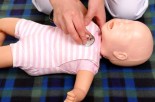Although children under age four are most at risk for choking on food and small objects, youngsters in their middle years can choke too.
A number of foods or other items -- hot dogs, poorly chewed pieces of meat, grapes, raw carrots, hard candy, balloons, small toy parts -- can become lodged in the child's airway (or trachea), keeping oxygen from reaching the lungs and the rest of the body as well. When the brain does not receive oxygen for more than four minutes, permanent brain damage and death can result.
If your child is having some breathing difficulties but is still able to speak or has a strong cough, do nothing yourself; the child's cough is better than any back blows or abdominal thrusts (Heimlich maneuver) you can administer.
But call 911 so that he or she can be transported to an emergency department, since a partial blockage of the airway could turn into a complete one.
Dr. Deborah Mulligan shares lifesaving tips on getting certified in infant and child CPR and ways to keep your children safe from hazards.
Selected Podcast
Infant & Child CPR: What to Do in an Emergency

Featuring:
 Dr. Deborah Mulligan received her Bachelor of Science degree from the University of San Francisco, Medical Doctorate from the University of California Los Angeles and completed pediatric emergency medicine training at Montefiore Medical Center/Albert Einstein College of Medicine. Director of the Institute for Child Health Policy and Clinical Professor of Pediatrics at Nova Southeastern University she reports directly to the Chancellor. The Institute is a resource for communities, policy makers, public and private agencies, professional organizations, foundations, and academic institutions. To be an optimal reserve, the ICHP at NSU conducts professional training and education, demonstration projects, engages in translational community-based participatory quantitative and qualitative research, developing
Dr. Deborah Mulligan received her Bachelor of Science degree from the University of San Francisco, Medical Doctorate from the University of California Los Angeles and completed pediatric emergency medicine training at Montefiore Medical Center/Albert Einstein College of Medicine. Director of the Institute for Child Health Policy and Clinical Professor of Pediatrics at Nova Southeastern University she reports directly to the Chancellor. The Institute is a resource for communities, policy makers, public and private agencies, professional organizations, foundations, and academic institutions. To be an optimal reserve, the ICHP at NSU conducts professional training and education, demonstration projects, engages in translational community-based participatory quantitative and qualitative research, developing
evidence-based public policy, participating in and serving as a venue to nurture community-based advocacy and research. The work emanating from ICHP has been recognized through coveted federal agency awards such as the SAMHSA Excellence in Community Communications and Outreach (ECCO) Gold award. Board certified in Pediatrics and Pediatric Emergency Medicine, past experience as physician executive includes role of Pediatric Services Medical Director for nation’s 4th largest safety net hospital system serving a county of 1.6 million residents
Deborah Ann Mulligan, MD
 Dr. Deborah Mulligan received her Bachelor of Science degree from the University of San Francisco, Medical Doctorate from the University of California Los Angeles and completed pediatric emergency medicine training at Montefiore Medical Center/Albert Einstein College of Medicine. Director of the Institute for Child Health Policy and Clinical Professor of Pediatrics at Nova Southeastern University she reports directly to the Chancellor. The Institute is a resource for communities, policy makers, public and private agencies, professional organizations, foundations, and academic institutions. To be an optimal reserve, the ICHP at NSU conducts professional training and education, demonstration projects, engages in translational community-based participatory quantitative and qualitative research, developing
Dr. Deborah Mulligan received her Bachelor of Science degree from the University of San Francisco, Medical Doctorate from the University of California Los Angeles and completed pediatric emergency medicine training at Montefiore Medical Center/Albert Einstein College of Medicine. Director of the Institute for Child Health Policy and Clinical Professor of Pediatrics at Nova Southeastern University she reports directly to the Chancellor. The Institute is a resource for communities, policy makers, public and private agencies, professional organizations, foundations, and academic institutions. To be an optimal reserve, the ICHP at NSU conducts professional training and education, demonstration projects, engages in translational community-based participatory quantitative and qualitative research, developing evidence-based public policy, participating in and serving as a venue to nurture community-based advocacy and research. The work emanating from ICHP has been recognized through coveted federal agency awards such as the SAMHSA Excellence in Community Communications and Outreach (ECCO) Gold award. Board certified in Pediatrics and Pediatric Emergency Medicine, past experience as physician executive includes role of Pediatric Services Medical Director for nation’s 4th largest safety net hospital system serving a county of 1.6 million residents